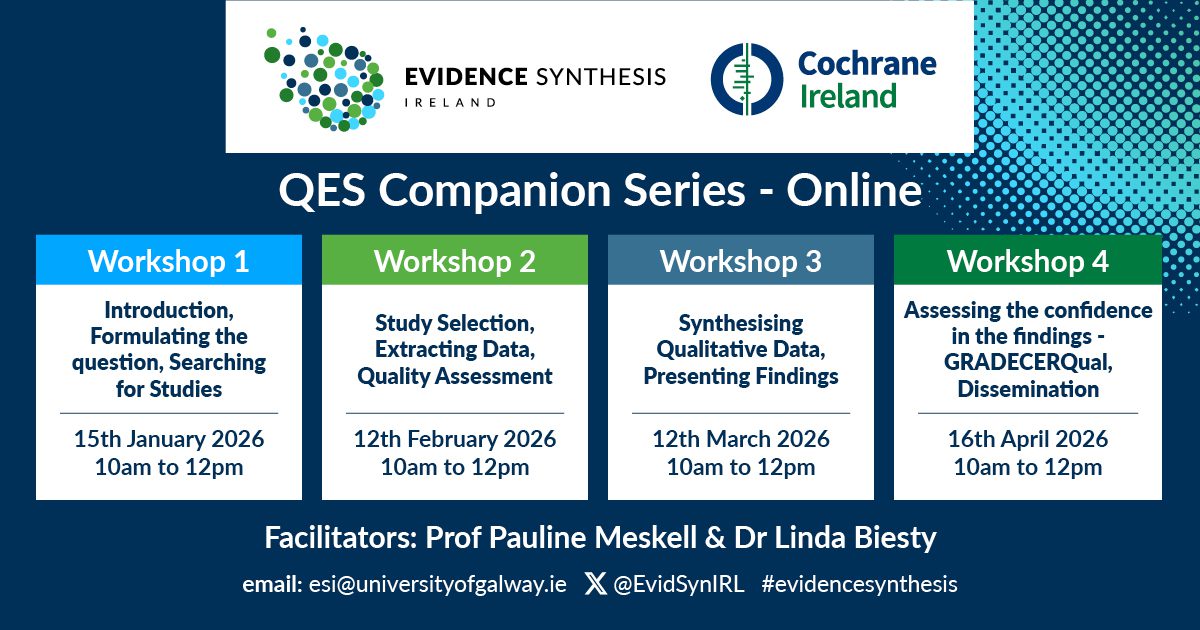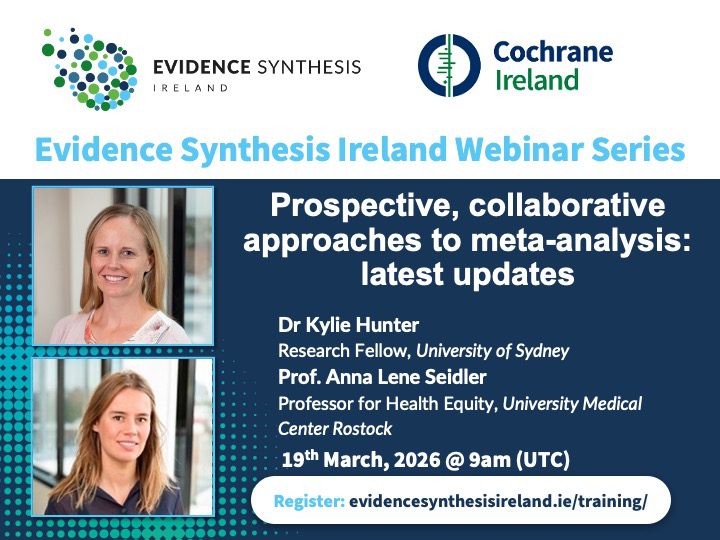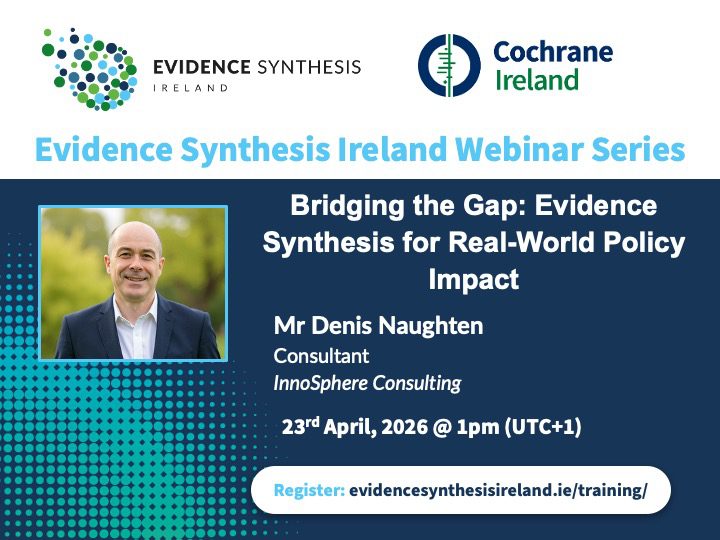Making more of
Evidence Syntheses
Evidence Synthesis Ireland (ESI), which hosts Cochrane Ireland, aims to make evidence syntheses more usable in every sense of the word – better designed, conducted and reported, more useable for decision-makers and more usable within health care policy and clinical practice decision making across the island of Ireland and beyond.
What We Do
Provide Training
We provide education for researchers, clinicians, the public and policymakers who conduct or use evidence syntheses.
Build Capacity
We build capacity in planning, doing and sharing evidence syntheses through Fellowships, workshops and scholarships.
Advance Knowledge
We advance the way we plan, do and share the results of evidence synthesis by finding out how to do these steps better.






Upcoming training
Our training streams include qualitative evidence synthesis, scoping reviews and rapid reviews, Cochrane methodology, mixed methods and more
march 2026
Event Details
Background: This series of workshops will provide reviewers, at the beginning of their journey in conducting a Qualitative Evidence Synthesis (QES)
Event Details

Background:
This series of workshops will provide reviewers, at the beginning of their journey in conducting a Qualitative Evidence Synthesis (QES) with a comprehensive overview of the methodology and methods including a Cochrane QES reviews. The series will offer insights into the development of a protocol, introducing participants to the methods of question generation, identification of included studies, data extraction and synthesis, the GRADECERQual assessment of confidence in the findings, and presentation the review for dissemination.
Aim:
The purpose of these workshops is to familarise all participants with the steps involved in conducting a Qualitative Evidence Synthesis.
We have designed these workshops as a companion series to allow attendees to apply what they have learned, enabling them to gain practical experience before progressing to the next stage of the process.
Objective:
The objectives of the workshops are intended to provide participants with an understanding of the methods of QES and equip them with the practical skills needed to conduct such a syntheses effectively.
Workshop 1: will provide an Introduction to QES, including overview. We will explore how you can focus your review question and search for qualitative evidence.
Workshop 2: will highlight the methods of screening and inclusion processes including selecting studies. We will demonstrate how data are extracted for a QES and a Quality Assessment is conducted.
Workshop 3: will delve into choosing a method of synthesis, and demonstrate how to synthesisinse qualitative data and present the findings
Workshop 4: we will illustrate the process of conducting an assessment of confidence in the findings of the QES using the GRADECERQual approach, and explore methods of writing up a review for dissemination.
Learning outcomes:
The learning outcomes for participants in this series should support them to:
- develop an understanding of the principles of QES and its importance in research
- define a research question suitable for QES
- explore methods for systematically searching and selecting relevant qualitative studies
- develop the skills to assess the quality of qualitative research studies
- gain proficiency in data extraction and methods of qualitative data synthesis
- learn how to conduct an assessment of confidence in the findings of a QES
- explore strategies for presenting and reporting the findings of a QES
Teaching strategies:
The workshops will consist of a mixture of short presentations and discussions led by members of the ESI Teaching Faculty, covering each of the methods of a QES. Breakout rooms will be used for small group activities based around worked examples and exercises. These activities will provide participants with the opportunity to discuss and develop their own skills and understanding. Participants will also be provided with a reading list and additional resources.
Places: 30 places available for individuals who are resident on the island of Ireland
Workshop 3 fee: General €40; Student €20
Overall fee for 4 workshops: General €120; Student €60
Skill level: Introductory
Prerequisites: Knowledge of qualitative research methodologies and methods
Target Audience:
Facilitators
Prof. Pauline Meskell, Head of Department of Nursing and Midwifery, University of Limerick
Dr Linda Biesty, Associate Professor (Midwifery), University of Galway
*If your type of ticket is sold out, please join the waitlist or contact us at esi@universityofgalway.ie
more
Additional Information
More informationRegistration
Click HereTime
(Thursday) 10:00 am - 12:00 pm
Location
ONLINE
Event Details
To register, CLICK HERE This webinar will offer a sneak-preview of the soon to be published latest updates to the Cochrane Handbook chapter on prospective, collaborative
Event Details
To register, CLICK HERE
This webinar will offer a sneak-preview of the soon to be published latest updates to the Cochrane Handbook chapter on prospective, collaborative approaches to evidence synthesis. Participants will learn about prospective meta-analysis (PMA) and other collaborative approaches, including when to use them, their key advantages, and best practices for planning, conducting, reporting, and disseminating findings. Using practical examples, the session will demonstrate strategies for systematically searching trial registries, harmonising study designs and outcomes across trials, and managing large, global collaborations effectively.
Speaker:
Dr Kylie Hunter is a Research Fellow and co-lead of the NextGen Evidence Synthesis Team at the NHMRC Clinical Trials Centre, University of Sydney. She is Associate Convenor of the Cochrane Prospective Meta-Analysis Methods Group and was recently elected to the Cochrane Methods Executive. Her research focuses on collaborative evidence synthesis methodologies, in particular, individual participant data and prospective meta-analysis. She has led methods innovations that have shaped Cochrane guidance and global best practice, including guidance for searching clinical trials registers and the development of an individual participant data integrity tool. Dr Hunter applies these innovative methods to address high-priority research questions, with a particular focus on child health.
Prof. Anna Lene Seidler is Professor for Health Equity at University Medical Center Rostock and German Center for Child and Adolescent Health. She is also Honorary Affiliate at the NHMRC Clinical Trials Center at the University of Sydney, Honorary Principal Research Fellow at University College London, and Convenor and primary contact of the Cochrane Prospective Meta-Analysis Methods Group. Prof Seidler has made major research contributions to the field of methods development for next generation evidence synthesis approaches, such as prospective meta-analysis, and individual participant data meta-analysis. The next generation evidence synthesis approaches she develops are geared toward moving beyond the one-size-fits all approach and toward understanding differential health system needs for different population groups (e.g. by socio-economic position, for rural populations, or for Indigenous health).

more
Registration
CLICK HERETime
(Thursday) 9:00 am - 10:00 am
Location
ONLINE
april 2026
Event Details
Background: This series of workshops will provide reviewers, at the beginning of their journey in conducting a Qualitative Evidence Synthesis (QES)
Event Details

Background:
This series of workshops will provide reviewers, at the beginning of their journey in conducting a Qualitative Evidence Synthesis (QES) with a comprehensive overview of the methodology and methods including a Cochrane QES reviews. The series will offer insights into the development of a protocol, introducing participants to the methods of question generation, identification of included studies, data extraction and synthesis, the GRADECERQual assessment of confidence in the findings, and presentation the review for dissemination.
Aim:
The purpose of these workshops is to familarise all participants with the steps involved in conducting a Qualitative Evidence Synthesis.
We have designed these workshops as a companion series to allow attendees to apply what they have learned, enabling them to gain practical experience before progressing to the next stage of the process.
Objective:
The objectives of the workshops are intended to provide participants with an understanding of the methods of QES and equip them with the practical skills needed to conduct such a syntheses effectively.
Workshop 1: will provide an Introduction to QES, including overview. We will explore how you can focus your review question and search for qualitative evidence.
Workshop 2: will highlight the methods of screening and inclusion processes including selecting studies. We will demonstrate how data are extracted for a QES and a Quality Assessment is conducted.
Workshop 3: will delve into choosing a method of synthesis, and demonstrate how to synthesisinse qualitative data and present the findings
Workshop 4: we will illustrate the process of conducting an assessment of confidence in the findings of the QES using the GRADECERQual approach, and explore methods of writing up a review for dissemination.
Learning outcomes:
The learning outcomes for participants in this series should support them to:
- develop an understanding of the principles of QES and its importance in research
- define a research question suitable for QES
- explore methods for systematically searching and selecting relevant qualitative studies
- develop the skills to assess the quality of qualitative research studies
- gain proficiency in data extraction and methods of qualitative data synthesis
- learn how to conduct an assessment of confidence in the findings of a QES
- explore strategies for presenting and reporting the findings of a QES
Teaching strategies:
The workshops will consist of a mixture of short presentations and discussions led by members of the ESI Teaching Faculty, covering each of the methods of a QES. Breakout rooms will be used for small group activities based around worked examples and exercises. These activities will provide participants with the opportunity to discuss and develop their own skills and understanding. Participants will also be provided with a reading list and additional resources.
Places: 30 places available for individuals who are resident on the island of Ireland
Workshop 4 fee: General €40; Student €20
Overall fee for 4 workshops: General €120; Student €60
Skill level: Introductory
Prerequisites: Knowledge of qualitative research methodologies and methods
Target Audience:
Facilitators
Prof. Pauline Meskell, Head of Department of Nursing and Midwifery, University of Limerick
Dr Linda Biesty, Associate Professor (Midwifery), University of Galway
*If your type of ticket is sold out, please join the waitlist or contact us at esi@universityofgalway.ie
more
Additional Information
Coming SoonRegistration
Click HereTime
(Thursday) 10:00 am - 12:00 pm
Location
ONLINE
Event Details
To register, CLICK HERE This webinar will demonstrate how evidence synthesis converts dispersed studies into clear, timely guidance that meets policy demands and makes research usable.
Event Details
To register, CLICK HERE
This webinar will demonstrate how evidence synthesis converts dispersed studies into clear, timely guidance that meets policy demands and makes research usable. It will explain how to read the policy landscape and align outputs with decision cycles. Participants will learn to identify government priorities by matching research needs to policy agendas and Programme for Government commitments, and to recognise opportunities within the Oireachtas by linking syntheses to forthcoming bills and parliamentary hearings. Engagement strategies include making research personal by connecting findings to lived problems and service delivery, and building relationships through informal networks alongside formal submissions. The webinar will emphasise that concise syntheses, supported by briefing papers and dialogue, are essential to bridge the research–policy gap. Attendees will leave with practical tools to map priorities, spot legislative windows, and deliver targeted syntheses that improve usability and influence.
Speaker:
Denis Naughten is a leading advocate for the integration of technology into policy and legislation worldwide. As Chair of the Inter-Parliamentary Union (IPU) Working Group on Science and Technology, Denis played a key role in developing the global Ethical Charter on Science & Technology. This initiative offers a framework for regulating emerging technologies, including artificial intelligence (AI), and addresses their ethical implications. He is a Fellow of the World Academy of Art & Science and a member of the High-Level Advisory Group to the Technical & Economic Assessment Panel of the UN’s Climate & Clean Air Coalition. With over 27 years as a TD, serving as Minister for Communications, Climate Action and Environment, representing Ireland on the Council of the European Union, chairing two Oireachtas Committees, and holding numerous senior roles in politics and parliament, Denis now runs a consultancy focused on translating research into actionable policy for societal improvement.

more
Registration
CLICK HERETime
(Thursday) 1:00 pm - 2:00 pm
Location
ONLINE
Event Details
Dates: 30th April 2026 Time: 09:30 – 16:00 Places: 42 places available for individuals who are resident in Ireland & Northern Ireland Location: Riddel Hall, Queen’s University Belfast Prices: General €50; Student €30 Aim: The
Event Details
Dates: 30th April 2026
Time: 09:30 – 16:00
Places: 42 places available for individuals who are resident in Ireland & Northern Ireland
Location: Riddel Hall, Queen’s University Belfast
Prices: General €50; Student €30
Aim: The aim of this workshop is to provide an introduction to the realist approach and how to do a realist review.
Objectives:
- The objectives of this workshop are to:
- Appreciate the key underpinning principles of a realist approach
- Understand ‘how’ to do a realist review
- Be able to identify a ‘good’ from a ‘not so good’ realist review to help build confidence in using a realist approach
Teaching strategies:
The workshop will consist of a mixture of short presentations on the underpinning philosophy of the realist approach, how to do a realist review, and what does a ‘good’ review look like. There will be plenty of practical sessions and time for questions and feedback from our local, national and international realist experts.
Requisites: Attendees must bring their laptop and also bring along an outline of an intervention, policy or programme that they would like to focus on during the practical sessions
Skill Level: Introductory
Target Audience: PhD students, Post-Doc Researchers and academics who would like to learn more about conducting realist reviews
Facilitators:
Dr Tracey McConnell is a Lecturer in Chronic Illness and Palliative Care in the School of Nursing and Midwifery, Queen’s University Belfast. She is also an Honorary Marie Curie Senior Research Fellow. She has been using realist approaches for over 10 years across mental health, palliative care and music therapy research. She currently leads an NIHR funded multi-site UK wide realist evaluation and has successfully completed two NIHR funded realist syntheses supported by Prof Geoff Wong. Tracey has supervised MSc and PhD students using a realist approach and is keen to build a realist support network across the Island of Ireland.
Geoff Wong is Professor of Primary Care in the Nuffield Department of Primary Care Health Sciences at the University of Oxford. He is an internationally and nationally recognised expert in realist review and evaluation. He has extensive expertise in conducting and providing methodological support for both approaches as well in their methodological development. He led the two UK National Institute of Health Research funded projects that developed quality and reporting standards, and training materials for realist reviews and realist evaluations (www.ramesesproject.org). He works part time as a GP in the NHS.
Dr. Brynne Gilmore, Assistant Professor Health Systems in University College Dublin, is an applied global health researcher who uses theory driven methodologies to evaluate and improve health programmes. She has been using realist reviews and evaluations for over 10 years and across numerous contexts. She has conducted or contributed to over 10 realist reviews or rapid realist reviews and seven realist evaluations. Brynne has written several realist methodology papers and book chapters, including on data analysis and synthesis, advisory groups and article appraisal. She is currently part of a team developing quality reporting standards for realist reviews, and is an advisor on two large international realist projects. She is a frequent peer reviewer and grant reviewer for realist projects, has supervised PhD students using realist methodologies and has examined realist PhDs.
Alejandro Argüelles Bullón, GMBPsS, MRSPH, EMCC, is a mental health researcher and Mental Health PhD student at Lancaster University (UK), where he received the Dean’s Ben Booth Award for Outstanding Contribution. His work focuses on realist approaches to mental health, with a strong emphasis on accessibility, cultural inclusion, and the role of lived-experience researchers in academic organisations. He is currently affiliated with Lancaster University and the University of Victoria (Canada) and is involved in national and international collaborations. Alejandro is the founder of RAÍCES, the first global Spanish-speaking realist research community, where he leads initiatives that promote inclusive, collaborative and linguistically accessible research across the Spanish-speaking world. He is also the host of The Realist Lens, a podcast dedicated to making realist approaches accessible and promoting interdisciplinary dialogue through open, community-driven conversations. Within just a few months, the podcast has gained over 600 subscribers and more than 9,000 views.
more
Additional Information
Click hereRegistration
Click hereTime
(Thursday) 9:30 am - 4:00 pm
Fellowships
Evidence Synthesis Ireland Fellowship Scheme
The innovative ESI Fellowships give Fellows the opportunity to learn about evidence synthesis, with hands-on experience of how to plan, design, conduct and report an evidence synthesis. Fellows are placed virtually with world-class evidence synthesis centres and review teams in Ireland and internationally, on policy and practice relevant reviews.

Research
Transforming how we understand and share research
We’re committed to improving how we gather, interpret, and share vast amounts of information, a process known as evidence synthesis. Our approach isn’t just about conducting research; it’s about improving the very methods we use to plan, conduct, and share the results of this process.
We work in many different research areas relevant to evidence synthesis and have a particularly strong focus on rapid reviews, knowledge translation and “studies within a review” (SWARs).
“ Reporting on health care topics can rely too much on asking experts or reporting the results of a single study…what would be much more useful to members of the public, especially when it comes to making decisions about their own health, is for people to understand how to situate health claims in the global body of evidence. “





